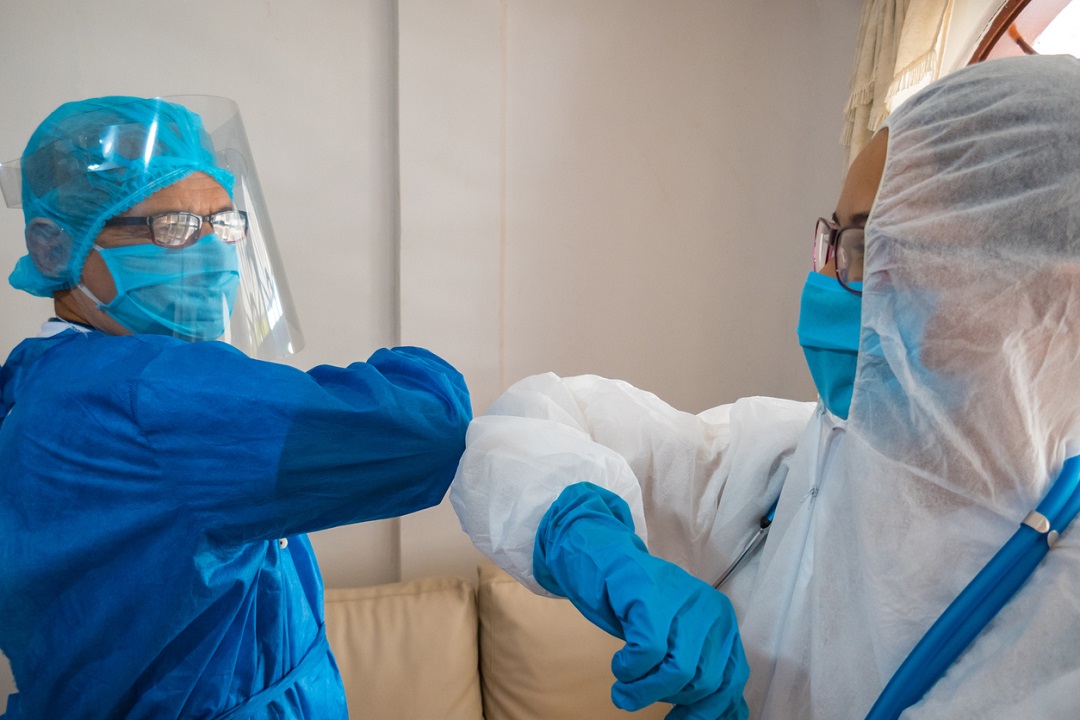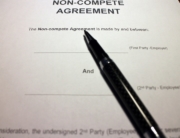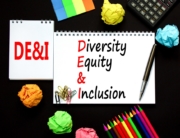SIA named the travel nurse as its first-ever person of the year for a number of reasons. Travel nurses are among those on the front lines fighting Covid-19 and they have proven crucial in helping people during the pandemic. For the past year they have faced challenges, stress and hard work head on. Many face contracting the disease while working to save others from it.
SIA spoke with three travel nurses to learn about their experience in the fight against Covid-19:
Stephanie Monds
Stephanie Monds, an ICU nurse, felt she had to do something after seeing images of hard-hit New York near the start of last year. Monds also knew that she would be working with Covid patients even if she stayed at her home in Georgia, and she was concerned about her husband and children as well as her 80-year-old father who lived next door.
“I knew I needed to be out there and helping, but I would be a significant risk to my family,” she says. “I would have to be away from them anyway.” So, she answered the call for help by traveling. To ensure safety, Monds drove from Georgia to New York by car rather than risk flying.
She was in New York for about six weeks before returning home. Monds says she was fortunate to remain healthy; she has seen other healthcare workers contract the disease. Monds later traveled in July on assignment to Arizona, another hard-hit area. That time she flew, but took precautions to remain safe.
A person can’t tell how they will react to Covid-19, Monds says. She knows of some people who had minor symptoms, but another friend contracted Covid and died.
“You don’t know how this is going to affect you, so it’s best just not to get it.”
In January, we interviewed Monds while she was on assignment through staffing firm Health Carousel at a facility in Iowa City, Iowa.
The biggest challenge in being a travel nurse, Monds says, is leaving her family for large blocks of time.
“They miss their momma, and I miss them,” Monds says of her children, who are taken care of by her husband when she is on assignment. “They understand but they are still kids.” But she notes that squashing the pandemic will ultimately make them safer.
“We’ve all had to sacrifice to some extent, anybody who is halfway responsible has had to sacrifice a lot,” Monds says, citing even the people who stay at home to avoid spreading the disease. However, considering the patients who have died alone, “What I’m doing is nothing compared to the sacrifice that they and their families had to make,” she says.
Monds says as a nurse she aims to help ease patients’ suffering. And not just for Covid patients, but those who come to hospitals with other health issues.
Monds also says she genuinely loves what she does.
“I think I’m most proud of bringing as much empathy and dignity that I can muster to my patients,” Monds says. “I like to feel that if I was the nurse taking care of them, I hope I made them feel they weren’t alone during the experience.”
She says working during the time of Covid has made her both a better nurse and better person. It has also given her a new perspective on the world as well.
“It will change you if you’ve been doing it for the past year. … If not, you need to find another job.”
Ervin J. Anonas
Ervin J. Anonas began working as a travel nurse in 2016 and has been in critical care and ICU ever since. He currently works with staffing firm Trusted Health at a facility in Ontario, California.
Last winter, he worked at a major trauma center in Palm Springs, California, when the facility began to see patients coming in with symptoms of acute respiratory distress syndrome. The patients were not getting better.
Information on the disease kept coming out, but “it was just so new,” Anonas says. The gravity of the situation was hitting the staff hard and some staff members even contracted Covid-19 because the screening process wasn’t as aggressive as it is now.
Overall, 2020 represented the highest-stress year in his career, he says.
“There’s a very human aspect to nursing. We are right there at the bedside. We are the hands that they hold.” There are times when a patient dies and Anonas needs to take five to 10 minutes of personal time.
Family and staying healthy is also a concern, and sanitation remains paramount. This includes taking scrubs off before getting in a car, immediately taking a shower when getting home and regular hand washing and sanitizing.
Anonas’ wife worked as a nurse prior to becoming a full-time mother for their two children, so she understands what he’s going through, he says, stressing that communication is important.
Healthcare workers have a close understanding of the disease.
“I think it just hits harder on us healthcare workers because we see what it is,” he says. “For those who are not on the front lines, they have the benefit of not seeing it. And I think that effects the decision-making.”
Anonas also says many people have stepped up during the pandemic and there is a lot of teamwork among nurses.
“A lot of nurses have a lot of nurses’ backs,” he says. “It’s just something about the profession.” When you are at that bedside 12 to 13 hours of the day, you absolutely rely on each other because you can’t do it alone.
Nurses are also putting their lives on the line to help patients.
“I’m proud to be an RN. I’m proud to be a travel nurse to fill in those gaps in staffing.”
Daniel Oh
Registered Nurse Daniel Oh works through international healthcare staffing firm Conexus MedStaff at Johnson City Medical Center in Eastern Tennessee.
Working with Covid is challenging given the unpredictability of how the disease will affect individual patients as well as the highly contagious nature of the virus, Oh notes. One key for him is the teamwork among his colleagues who offer support and help.
“Even though fighting against this pandemic has been very stressful, it keeps reminding me that the core of best nursing care should be based on teamwork,” Oh says.
One challenge for nurses is handling people’s misconceptions regarding Covid-19. Some people believe wearing masks and keeping social distancing are not effective. Fighting back against the misperceptions is something else nurses must deal with while remaining professional — nurses must fight against the sickness, not against sick people, Oh says.
Professionally, Oh is most proud of pursuing ideal nursing care while working in the Covid unit.
There’s also a story that he reminds himself of:
“Cows and snakes drink the same source of water and live on the same grass,” Oh says. “However, cows make milk to feed people, and snakes make venom to harm people.”
Oh pushes himself to be like the cow, taking his education and training to help people, all the while working to improve his skills.
Oh also sees his work during Covid as a way of giving back to the US as a South Korean immigrant. “About 70 years ago when the Korean war took place, the US sent 36,000 soldiers to protect South Korea from the North Korean invasion,” he says. “Working at a Covid unit in the US and trying to save American citizens’ lives is one of the ways that I can pay back the debt that I owe as a Korean.”
Wendy Bledsoe
Wendy Bledsoe has been a nurse for 35 years and has traveled as a travel nurse. Today, Bledsoe is director of nursing at Travel Nurse Across America, keeping in constant contact with nurses in the field.
“It’s really changed nursing,” Bledsoe says. Things are much busier in some areas such as ICU and less busy in others such as pediatrics.
Ratios have also changed with nurses expected to handle a greater patient load than before Covid due to an influx of patients and a decrease in nursing staff as some nurses are out themselves because of Covid-19. At the same time, nurses are still expected to do all the little things they do.
Treating Covid patients is tough because nurses must put on scrubs, a gown, a new mask, face shield, gloves and other protective clothing before seeing a patient and they must be changed each time. In addition, housekeeping and lab workers aren’t coming into the rooms, leaving more work for nurses.
“There’s a lot of little things you don’t realize,” Bledsoe says. If a patient asks for a cup of water, the nurse must go outside, get the water, then put back on all new personal protective equipment.
The death toll from Covid has also been high, and it’s something nurses aren’t used to and takes an emotional toll. Bledsoe says in one case, a nurse saw three patients die during a single shift. On top of this, nurses must communicate with family members of patients who are not allowed into hospitals.
She says the immense amount of work doesn’t leave time for nurses to do everything they would like to do.
But, Bledsoe says, nurses have stepped up to get the job done.







